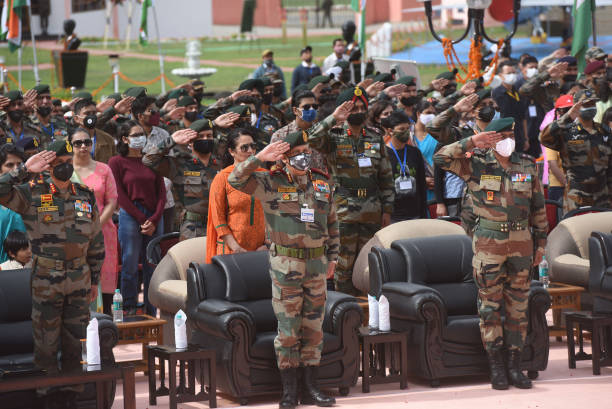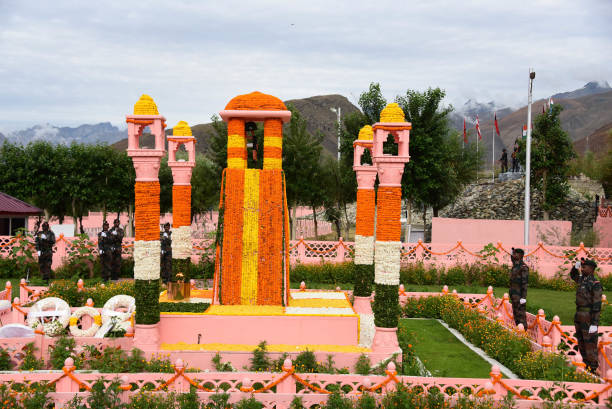Kargil Vijay Diwas: Date, History, Significance, ; All About India’s win in 1999 India – Pakistan War
Kargil Vijay Diwas is a significant day in the history of India as it commemorates the victory of the Indian Armed Forces in the Kargil War against Pakistan. This day is observed on July 26th every year to pay homage to the brave soldiers who fought valiantly and sacrificed their lives to defend the nation’s sovereignty.
The Kargil War took place between May and July 1999 in the Kargil district of Jammu and Kashmir. It was an armed conflict between India and Pakistan, triggered by the infiltration of Pakistani soldiers and armed militants into Indian territory across the Line of Control (LOC). The intruders took advantage of the rugged terrain and strategic positions in the high-altitude mountainous region.
Date:
On July 26, Kargil Vijay Diwas, also known as Kargil Victory Day, is commemorated to commemorate India’s victory over Pakistan in the 1999 war. The day honors the courage and sacrifices made by Indian soldiers throughout the grueling and protracted conflict.
History:

Kargil War, which took place between India and Pakistan in 1999. Here is a brief overview of the history of the Kargil War and the events leading up to Kargil Vijay Diwas, Kargil Vijay Diwas is a reminder of the bravery and dedication of the Indian soldiers who defended the nation’s sovereignty against all odds. It also reinforces the importance of unity and preparedness in safeguarding the country from external threats.
- Background: The conflict in the Kargil region is rooted in the long-standing territorial dispute between India and Pakistan over the region of Kashmir. The region has been a source of tension between the two countries since they gained independence from British rule in 1947.
- Infiltration and Intrusion: In early 1999, Pakistani forces, aided by armed militants, infiltrated across the Line of Control (LOC) that divides Indian-administered Kashmir and Pakistani-administered Kashmir. These intruders took positions in the high-altitude mountains in the Kargil sector of Jammu and Kashmir, aiming to cut off India’s access to the strategic highway connecting Srinagar to Leh.
- Discovery of Intrusion: The Indian Army initially believed the infiltrators to be local militants, but as the intensity of the conflict increased, it became evident that regular Pakistani soldiers were involved. The situation escalated rapidly, and the Indian government decided to respond to the intrusion.
- Indian Counteroffensive: India launched “Operation Vijay” on May 26, 1999, to drive out the intruders from the Kargil region. The Indian Armed Forces engaged in fierce battles against well-entrenched Pakistani forces at high altitudes, facing difficult terrain and adverse weather conditions.
- International Involvement: The Kargil War garnered significant international attention. The United States and other countries urged Pakistan to withdraw its troops, supporting India’s stance that the conflict was an act of aggression by Pakistan.
- Victory and Conclusion: After weeks of intense fighting, Indian forces managed to recapture most of the strategic peaks and positions held by the infiltrators. The decisive moment came on July 26, 1999, when the Indian Army recaptured the peak of Tiger Hill, a crucial vantage point in the region. This victory forced Pakistan to withdraw its remaining troops and led to the end of the conflict.
- Kargil Vijay Diwas: In honor of the valiant efforts and sacrifices made by the Indian Armed Forces during the Kargil War, Kargil Vijay Diwas is observed annually on July 26th. The day serves as a tribute to the martyrs and a celebration of India’s victory in the war.
Significance:

Kargil Vijay Diwas is a significant day in the history of India as it commemorates the victory of the Indian Armed Forces in the Kargil War against Pakistan. This day is observed on July 26th every year to pay homage to the brave soldiers who fought valiantly and sacrificed their lives to defend the nation’s sovereignty.
The Kargil War took place between May and July 1999 in the Kargil district of Jammu and Kashmir. It was an armed conflict between India and Pakistan, triggered by the infiltration of Pakistani soldiers and armed militants into Indian territory across the Line of Control (LOC). The intruders took advantage of the rugged terrain and strategic positions in the high-altitude mountainous region.
The significance of Kargil Vijay Diwas lies in the following aspects:
- Sacrifice and Bravery: Kargil Vijay Diwas is an occasion to remember and honor the supreme sacrifice made by the Indian soldiers who displayed immense courage and valor while facing challenging conditions during the war. The conflict involved intense and close combat, making it one of the most difficult and dangerous wars fought by the Indian Armed Forces.
- National Unity and Resolve: During the Kargil War, the entire nation came together, transcending political and regional differences, to support the Armed Forces and boost their morale. The resilience and unity demonstrated by the citizens of India played a crucial role in achieving victory.
- Strengthening of Diplomacy: The Kargil War highlighted the importance of international diplomacy in resolving conflicts. India effectively managed to isolate Pakistan diplomatically, gaining support from various countries and international organizations.
- Recognition of Military Prowess: The successful military operations showcased the capability and professionalism of the Indian Armed Forces. It demonstrated their commitment to safeguarding the nation’s territorial integrity and security.
- Lessons Learned: Kargil Vijay Diwas serves as a reminder of the importance of vigilance and preparedness in the face of external threats. It led to significant changes and improvements in India’s defense strategies and modernization of the armed forces.
- Tribute to Martyrs: The day is an opportunity for the entire nation to pay tribute to the soldiers who laid down their lives in the service of the country. Various events and ceremonies are held across the country to honor their memory and show gratitude to their families.
kargil vijay diwas
kargil war
kargil diwas
kargil war date
kargil vijay diwas 2022
kargil tempe
st Pakistan. This day is observed on July 26th every year to pay homage to the brave soldiers who fought valiantly and sacrificed their lives to defend the nation’s sovereignty.
The Kargil War took place between May and July 1999 in the Kargil district of Jammu and Kashmir. It was an armed conflict between India and Pakistan, triggered by the infiltration of Pakistani soldiers and armed militants into Indian territory across the Line of Control (LOC). The intruders took advantage of the rugged terrain and strategic positions in the high-altitude mountainous region.
Date:
On July 26, Kargil Vijay Diwas, also known as Kargil Victory Day, is commemorated to commemorate India’s victory over Pakistan in the 1999 war. The day honors the courage and sacrifices made by Indian soldiers throughout the grueling and protracted conflict.
History:
Kargil War, which took place between India and Pakistan in 1999. Here is a brief overview of the history of the Kargil War and the events leading up to Kargil Vijay Diwas, Kargil Vijay Diwas is a reminder of the bravery and dedication of the Indian soldiers who defended the nation’s sovereignty against all odds. It also reinforces the importance of unity and preparedness in safeguarding the country from external threats.
- Background: The conflict in the Kargil region is rooted in the long-standing territorial dispute between India and Pakistan over the region of Kashmir. The region has been a source of tension between the two countries since they gained independence from British rule in 1947.
- Infiltration and Intrusion: In early 1999, Pakistani forces, aided by armed militants, infiltrated across the Line of Control (LOC) that divides Indian-administered Kashmir and Pakistani-administered Kashmir. These intruders took positions in the high-altitude mountains in the Kargil sector of Jammu and Kashmir, aiming to cut off India’s access to the strategic highway connecting Srinagar to Leh.
- Discovery of Intrusion: The Indian Army initially believed the infiltrators to be local militants, but as the intensity of the conflict increased, it became evident that regular Pakistani soldiers were involved. The situation escalated rapidly, and the Indian government decided to respond to the intrusion.
- Indian Counteroffensive: India launched “Operation Vijay” on May 26, 1999, to drive out the intruders from the Kargil region. The Indian Armed Forces engaged in fierce battles against well-entrenched Pakistani forces at high altitudes, facing difficult terrain and adverse weather conditions.
- International Involvement: The Kargil War garnered significant international attention. The United States and other countries urged Pakistan to withdraw its troops, supporting India’s stance that the conflict was an act of aggression by Pakistan.
- Victory and Conclusion: After weeks of intense fighting, Indian forces managed to recapture most of the strategic peaks and positions held by the infiltrators. The decisive moment came on July 26, 1999, when the Indian Army recaptured the peak of Tiger Hill, a crucial vantage point in the region. This victory forced Pakistan to withdraw its remaining troops and led to the end of the conflict.
- Kargil Vijay Diwas: In honor of the valiant efforts and sacrifices made by the Indian Armed Forces during the Kargil War, Kargil Vijay Diwas is observed annually on July 26th. The day serves as a tribute to the martyrs and a celebration of India’s victory in the war.
Significance:
Kargil Vijay Diwas is a significant day in the history of India as it commemorates the victory of the Indian Armed Forces in the Kargil War against Pakistan. This day is observed on July 26th every year to pay homage to the brave soldiers who fought valiantly and sacrificed their lives to defend the nation’s sovereignty.
The Kargil War took place between May and July 1999 in the Kargil district of Jammu and Kashmir. It was an armed conflict between India and Pakistan, triggered by the infiltration of Pakistani soldiers and armed militants into Indian territory across the Line of Control (LOC). The intruders took advantage of the rugged terrain and strategic positions in the high-altitude mountainous region.
The significance of Kargil Vijay Diwas lies in the following aspects:
- Sacrifice and Bravery: Kargil Vijay Diwas is an occasion to remember and honor the supreme sacrifice made by the Indian soldiers who displayed immense courage and valor while facing challenging conditions during the war. The conflict involved intense and close combat, making it one of the most difficult and dangerous wars fought by the Indian Armed Forces.
- National Unity and Resolve: During the Kargil War, the entire nation came together, transcending political and regional differences, to support the Armed Forces and boost their morale. The resilience and unity demonstrated by the citizens of India played a crucial role in achieving victory.
- Strengthening of Diplomacy: The Kargil War highlighted the importance of international diplomacy in resolving conflicts. India effectively managed to isolate Pakistan diplomatically, gaining support from various countries and international organizations.
- Recognition of Military Prowess: The successful military operations showcased the capability and professionalism of the Indian Armed Forces. It demonstrated their commitment to safeguarding the nation’s territorial integrity and security.
- Lessons Learned: Kargil Vijay Diwas serves as a reminder of the importance of vigilance and preparedness in the face of external threats. It led to significant changes and improvements in India’s defense strategies and modernization of the armed forces.
- Tribute to Martyrs: The day is an opportunity for the entire nation to pay tribute to the soldiers who laid down their lives in the service of the country. Various events and ceremonies are held across the country to honor their memory and show gratitude to their families.



